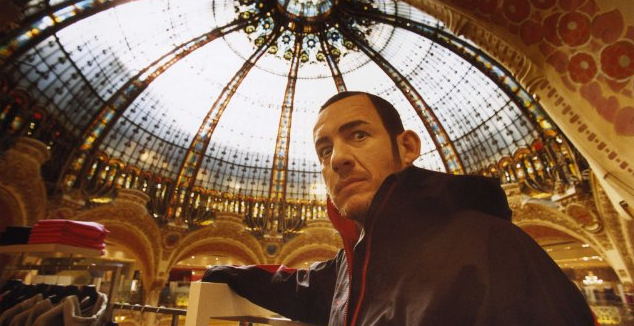Micmacs
French auteur Jean-Pierre Jeunet has a reputation, at least in America, for making films that are visually striking and almost unbearably quaint. His biggest hit in this country, “Amelie” (2001), presented everyday life in Montmartre as a whirlwind of sensory delight, in which Edith Piaf wafted through every Metro station. Jeunet’s focus on visual puns, gadgetry, and occasional slapstick serves him well with his new film “Micmacs”—but unlike “Amelie,” in this instance the gags and the gadgets seem to be doing a bit of covering up for a lack of narrative substance.
”Micmacs” follows Bazil (Dany Boon), whose father is killed by a landmine when he is a child, and who, as an adult, is accidentally shot in the head during a drive-by shooting. He survives, but the bullet is left in his skull, and he warns others that it might “pop at any moment.” Unable to keep his job, Bazil tries his luck as a street performer. After a while, he is taken in by a band of misfits who live in a labyrinthine cave made of trash. They include a human cannonball, a contortionist, a math genius, an ex-ethnographer, and Yolande Moreau (always great) as a grand maternal figure, perpetually ladling out food.
Bazil, ever enterprising, has decided to get back at the companies that manufactured the landmine that killed his father and the bulled that’s lodged in his head. In Jeunet’s usual satirical fashion, the two gigantic buildings happen to be directly across from one another. At this point the story turns away from the misfits’ inner world and instead focuses on Bazil’s schemes to play the heads of the respective companies against each other. Eventually, after many hijinks and some lovely visual Rube Goldberg moments, Bazil gets what he wants and the evil arms dealers are appropriately discredited.
I left the theatre somewhat unfulfilled. ‘Micmacs” reminded me forcefully of “Delicatessen” (1991), not just because Dominique Pinon (the lead in “Delicatessen”) plays a prominent role here too, but because “Micmacs” tells the story of a group of comrades exiled from the rest of society. However, it’s beginning to feel like Jeunet has tread similar ground many times before.
The characters’ banter and the mile-a-minute visual gags are a little too predictable for the intended effect to really take hold. Bazil’s moments of inspiration and romance feel too contrived; there’s none of the breathless spontaneity of “Amelie” or the black comedy of “Delicatessen” to sustain the film in moments of calm. “Micmacs” puts up a small attempt at political commentary, but it’s just another of Jeunet’s jack-in-the-box toys.
Nevertheless, it’s worth noting that a bad Jeunet film is better than most of what’s out there these days—and “Micmacs” certainly isn’t bad. It’s just not all that you’d like it to be.
“Micmacs” premiered in the U.S. on March 13, 2010 at SXSW; now playing in select theaters nationwide.





